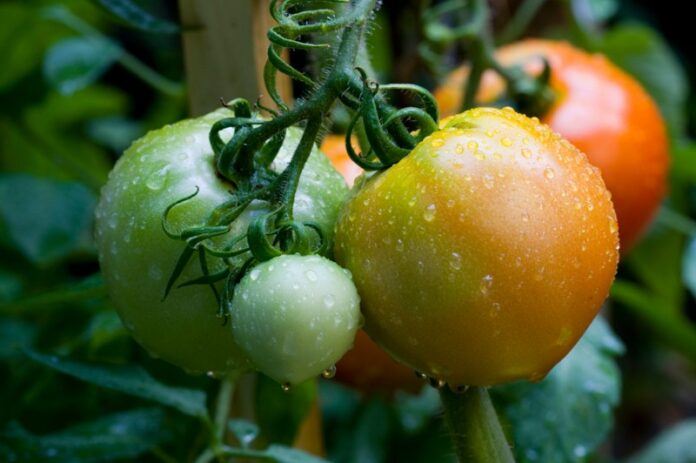Dr Elijah Gitari’s seven-acre farm is a marvel to behold with plots of healthy tomatoes at different stages of maturity “As a young man I did not love farming. I just tried crop cultivation to keep busy. But now this is my passion,” says Elijah Gitari, a successful tomato farmer in Kirinyaga County.
That was in the early 1990s and he would gradually come to adore farming when he made a tidy sum from his first crop of tomatoes. Though his first crop was on small-scale, it was an eye-opener to him on the huge potential that lay in agribusiness
Thus, he decided to continue growing tomatoes every season as a side venture while still keeping his full time job as a veterinary officer. Once he retires from his job in Kirinyaga County, Gitari plans to tend to his tomatoes full time. “When I look back, I am happy I ventured into serious farming. During peak seasons, from a single sale of tomatoes I make more than my monthly salary,” he says. His seven-acre farm is a marvel to behold with plots of healthy tomatoes at different stages of maturity. Some are just a week old after transplanting; some blossoming tomatoes; and others almost ripening. Between the plots of tomatoes dot a few plots of maize, vegetables and thorn melons, which Gitari explains is a cultural method of managing pests and diseases.
Gitari has mastered his farming that farmers travel long distances to tap from his vast knowledge. The farmer-cum-vet rakes in millions of shillings in profits every year, which has enabled him put his children through university with ease. From an acre of a healthy crop, Gitari harvests about 300 crates of tomatoes (the wooden box of 60kgs). He says marketing is not a challenge since demand for tomatoes is high most times of the year. If he has crop when price is high at Sh5,000 to Sh6,000, he earns about Sh1.5 million from an acre. He incurs about Sh150,000 to tend an acre of tomatoes to maturity. But there are times when prices fluctuate to lows of Sh1,000 per crate.
“I try to maximise my profit by having a crop ready for the market throughout the year. Seasons of high prices are more frequent than those of low prices,” he notes. Timing has always been cited as a critical factor if you want to get it right with market for tomatoes but Gitari has a different view. “The problem is that every farmer is timing the market and flooding it with tomatoes that cost a lot to produce using irrigation water. They earn little from the crop,” he points out. Always do a soil test Gitari also does not see the rationale of transporting his tomato to markets in Nairobi where he will make just an extra Sh1,000 per crate but incur transport and other logistical expenses. To help with work, he employs between 15 and 25 workers every day and pays them between Sh300 and Sh400 and considers labour an expensive component in tomato farming. As an organised farmer, he takes his soil for testing to determine its deficiencies and the nutritional elements to add. He plants the tomato in a nursery where he sprays as recommended to keep off pests and diseases, especially fungal ones. Gitari transplants the seedlings after 21 to 30 days while observing the recommended spacing of 60X100cm.

“I also constantly check the crop to ensure it is watered, fertiliser applied, sprayed, pruned, staked and weeded as required. Where I am unsure, I consult experts,” he says. Gitari advises farmers to use hybrid seeds variety because their yield is double that of ordinary varieties. “Though hybrid seeds are costly, they are tolerant to pests and diseases and climate change hence the higher yields,” he says. The vet plants the hybrid Zara F1 tomato variety that is billed as early maturing, more productive and disease resistant. “I planted two blocks of Zara F1 variety and the ordinary tomatoes in another block. I have noticed that the new variety did not wilt while the ordinary variety wilted by almost 90 percent,” he says. This forced him to clear the wilted tomato, re-plough and plant another crop. He says he would have steered clear of the loss had he embraced the new variety. Wilting is a major challenge that farmers in the county and neighbouring regions face as it leads to heavy losses.
Gitari also cautions farmers against seed saving, which involves extracting seeds from overripe tomatoes, drying and replanting them later, saying the resultant plants give lower yields. Francis Rakita, an agronomist, advises farmers to practice integrated pest management that entails among other things use of traps to manage fruit flies, thrips and other pests. Rakita says way a farmer does not apply too much chemicals on their crops which would be harmful to health. He says use of traps is in the long run cheaper than using a lot of chemicals. Douglas Munyao, an agronomist, urges farmers to practise crop rotation to keep away pests and diseases.








